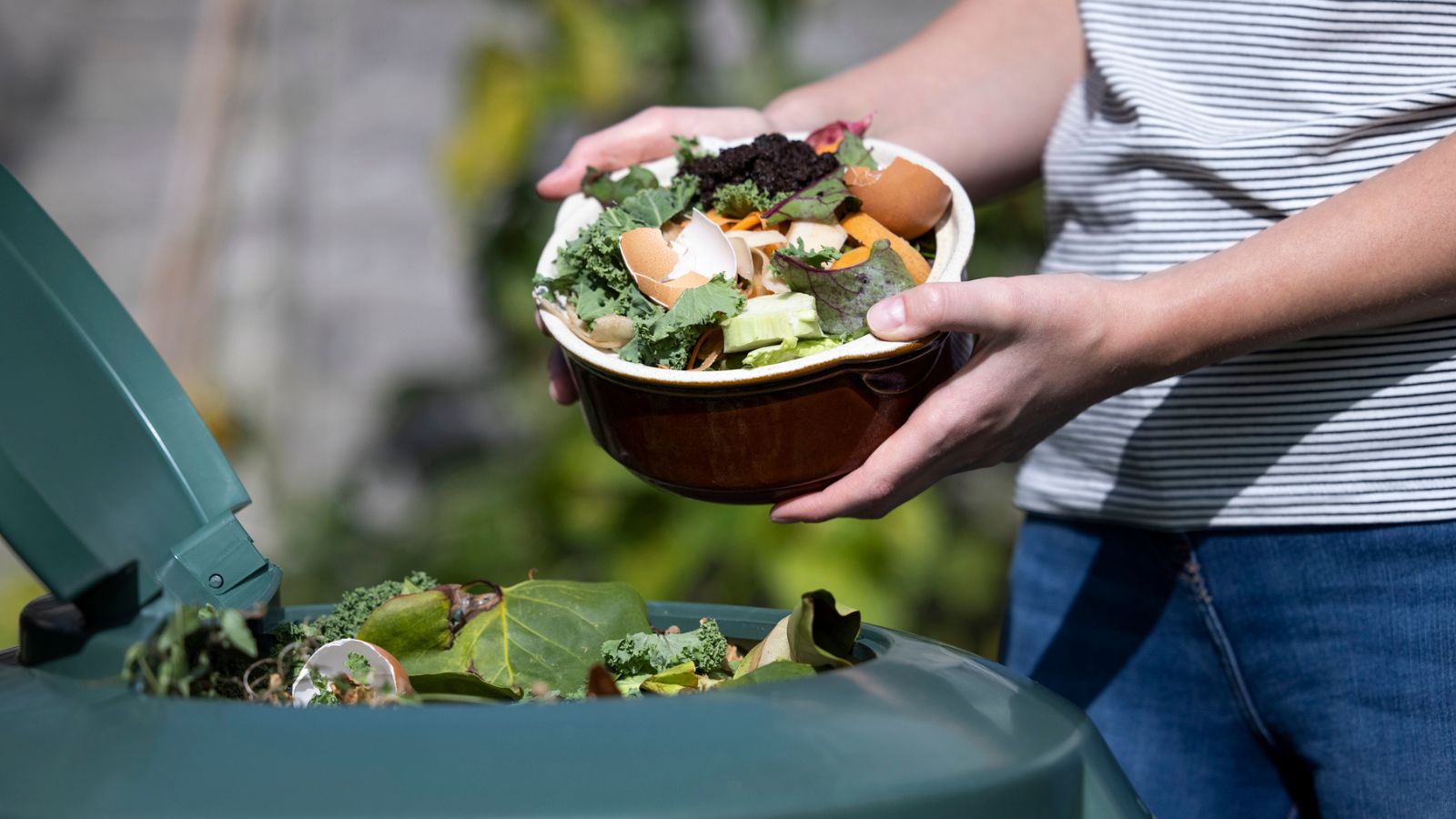Why are there maggots in my house? Pest experts reveal the sources and reasons
This summer pest can be easily banished once you've tracked down the culprits


So you've just found maggots in your house – and are no doubt wondering not just why they are there but how they got there.
Obviously, your first thought will be how to kill the maggots, but to avoid coming across them in your home again, it's vital to tackle the reasons why they have appeared in the first place.
Luckily, the fixes are simple: we spoke to pest and cleaning experts to discover why maggots are often found in homes, particularly at this time of year, so that you can avoid the nasty shock of discovering them in future.
Why are there maggots in my house?
Maggots are fly larvae, so Michael Thome, an associated certified entomologist with Western Exterminator, recommends starting with flies, making your spaces unattractive to them, heading off an infestation of maggots.
1. You have allowed flies into your house
The source of your maggot problem starts with flies, which lay eggs that will hatch into maggots. In the height of summer, when windows and doors are left open, it is often difficult to keep flies out of the house and off your surfaces. Hot Shot Flying Insect Killer, at Amazon, can be an effective solution for solving an immediate problem, but prevention is better than cure, so you may need to look at closing windows or investing in fly screens.
However, even with screens, flies still find a way in, so you may need to look for other points of entry, such as cracks and crevices. Also, ask yourself why there are so many flies in your house?
If your home contains areas that flies are attracted to, such as food waste, trash and dirt, then this may be why flies, and therefore maggots, are in your home.
To spot the beginnings of a maggot problem in your home, look for flies hovering around dirty areas inside the house and outside, perhaps by trash cans, or search for maggots themselves, which look like small white worms.
Factors such as high temperatures (keep food waste out of the sun), exposed food, dirt and humidity can all increase the presence of maggots as well as speeding up their life cycle, meaning they can develop into flies even faster. These flies will then lay eggs, leading to further maggots. This can happen in as short a window as a week. It is therefore essential to take action to prevent and remove flies from your home as soon as possible to prevent a maggot infestation, which can multiply quickly.
2. You have left the lid off trash cans
Taking a few extra steps with your trash is a simple home remedy for getting rid of flies in your house and can, as a result, significantly reduce any nascent maggot problem.
'Make sure that all trash placed in cans is in a bag,' continues Michael Thome, an associated certified entomologist with Western Exterminator. 'If the trash is especially nasty or attractive (for example, pet waste), consider placing it in a smaller bag first, then into the larger bag.'
He also suggests ensuring all trash cans have lids that seal properly and consider replacing a can with holes from years of use.
It's also really important to make sure you wash out your food waste containers after the trash has been taken out to reduce fly-attracting odors and the chance of any fly larvae being left behind.
Don't let your trash overfill so the lid won't properly close, since flies will get in any small opening. If you have the option of storing your trash in a kitchen cabinet (preferably by itself so as to not contaminate other stored objects), this can be highly effective at preventing the bad smell and exposed dirt that invites flies into your home.
Rinse packaging and food trays that can't be recycled before throwing them away to reduce dirt and smells. All recycling material such as cans, bottles and jars should be clean or at least rinsed if they contained anything such as food or liquid that may attract flies.
Rubbing herbal oils such as elder, lavender or mint in your trash or in the lid to counteract some of the trash smell can reduce the presence of flies. Alternatively, you can use Hot Shot No-Pest strip insect killer, available at Walmart inside your trash can. You can find herb oils at Amazon, too.
4. You have left used dishes out
Millie Hurst, Homes & Gardens' Solved Section Editor and cleaning expert says:
'As tempting as it is to leave dirty dishes out on the counter to clear up later, this does increase the chance of getting maggots. As we all know, the warmer months bring more flies into our homes, and if they land on your leftovers, they may well lay their eggs on them – and these will later hatch into maggots.
'So if you opened your trash can to a nasty surprise recently, take it as a reminder for you and other household members to put dishes in the dishwasher rather than leaving them out on the side.
'Unfortunately, this also applies to pet food, which can attract maggots, so ensure you store your pet's food in airtight containers.'

Millie Hurst is Section Editor at Homes & Gardens, overseeing the Solved section, which provides readers with practical advice for their homes. Millie has written about and tried out countless cleaning and DIY hacks in the six years since she became a journalist, and has worked in both London and New York.
4. You have left pet food out
A common mistake that pet owners make is leaving pet food uncovered. However, not only can this encourage the presence of flies but it can be dangerous for your pets, especially if flies have laid eggs on their food. So if you are unsure if a fly may have laid eggs on your pet's food, just throw it away – you don't want your pet ingesting eggs or maggots.
Millie Hurst continues: 'It helps to store pet food in a cool, dry place. Be sure to clear up any leftovers from your pet's food rather than leaving it uncovered, as flies will be just as interested in your dog's dinner as your own. If despite making these small changes, the problem persists, consider placing Dr Killigan's The Fly Inn fly traps, at Walmart near to your pet's food.'
FAQs
How do you find the source of maggots?
Once a fly lays eggs, maggots will hatch within 24 hours. Although it's an almost impossible task to spot fly larvae, you can probably easily work out which areas may have attracted flies, and clean them as soon as possible before the maggots have a chance to hatch.
To prevent flies from being enticed into your home, keep your surfaces, especially in the kitchen, clean and wiped. Throw away any rotting and decaying food such as fruit as well as any out of date food.
In addition to ensuring you don't leave trash cans open, make sure that no dirty dishes are left out, and if you don't have time to wash and stack your dishes immediately, try to rinse, soak or cover dirty dishes.
Using cleaning and disinfectant products with a fragrance will deter flies in the future, since odor is the root of fly problems, and maggots dislike flowery scents. Essential herbal oils work: you can find herb oils at Amazon.
How long does a maggot infestation last?
Maggots exist in this form for under a week, at which time they transition into pupae and then within three to four weeks they develop into adult flies.
Female flies, who live for a month, can lay between 500-2,000 larvae, meaning a maggot infestation is not an unlikely scenario once you spot the beginnings of it, since maggots can multiply rampantly.
Without directly dealing with your maggot problem the question may become how large is the maggot infestation rather than how long it will last, because the longer the problem is left, the bigger it will become.
Although having a maggot problem can seem daunting, we have plenty of tips and different methods for how to banish these pests, as long as you can spot the problem as soon as possible and generally maintain a sanitary home environment, the solution should not be too difficult.
Fly spray, such as Hot Shot Flying Insect Killer, at Amazon, can be used on maggots, but boiling water and a small amount of bleach can also be an effective solution when cleaning out the trash and killing maggots.
If you want a simple solution using only household products, salt can be used to dehydrate and kill maggots.
Removing and preventing maggots is key to keeping up summer spirits and making the most of a clean kitchen for whatever summer dishes and dinner parties you are looking forward to.
Sign up to the Homes & Gardens newsletter
Design expertise in your inbox – from inspiring decorating ideas and beautiful celebrity homes to practical gardening advice and shopping round-ups.

Lola Houlton is a news writer for Homes & Gardens. She has been writing content for Future PLC for the past six years, in particular Homes & Gardens, Real Homes and GardeningEtc. She writes on a broad range of subjects, including practical household advice, recipe articles, and product reviews, working closely with experts in their fields to cover everything from heating to home organization through to house plants. Lola is a graduate, who completed her degree in Psychology at the University of Sussex. She has also spent some time working at the BBC.
-
 Joanna Gaines' summer Magnolia collection captures the spirit of summer with pretty florals and nostalgic charm – here's everything I'm shopping first
Joanna Gaines' summer Magnolia collection captures the spirit of summer with pretty florals and nostalgic charm – here's everything I'm shopping firstEqual parts playful and polished – this collection brings Joanna's signature warmth to summer living
By Charlotte Olby
-
 Apple and elderflower martini
Apple and elderflower martinispring cocktail — light, floral and easy to batch for a crowd
By Alice Hart